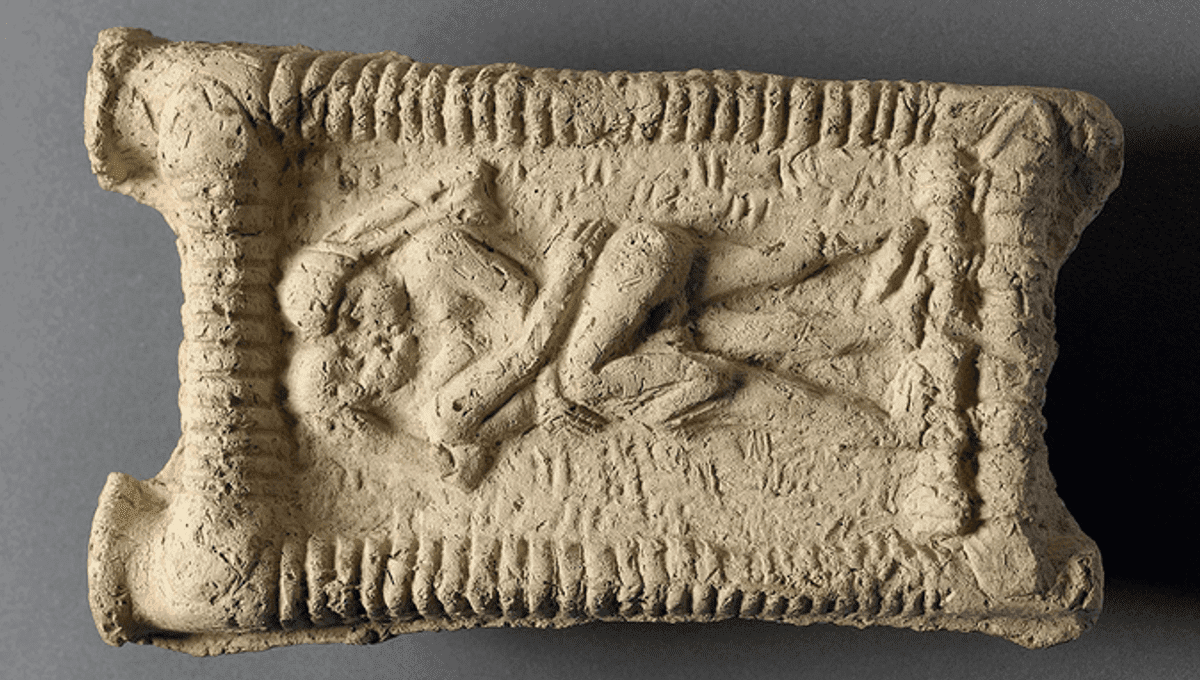
Humans have been French kissing since long before the language of amour was invented, which means we may have been spreading diseases by snogging throughout our history. Highlighting the ancient roots of kissing in a new article, researchers say the first documented smooch can be traced back to 4,500 years ago in Mesopotamia, although it’s likely that people were already canoodling since much earlier than that.
“In ancient Mesopotamia, which is the name for the early human cultures that existed between the Euphrates and Tigris rivers in present-day Iraq and Syria, people wrote in cuneiform script on clay tablets,” explained author Dr Troels Pank Arbøll in a statement. “Many thousands of these clay tablets have survived to this day, and they contain clear examples that kissing was considered a part of romantic intimacy in ancient times, just as kissing could be part of friendships and family members’ relations.”
Dating all the way back to around 2500 BCE, these ancient kissing chronicles describe a number of curious incidents and conventions. For example, one text from about 3,800 years ago recounts the case of a married woman who was “almost led astray by a kiss from another man,” while another source of a similar age describes “an unmarried woman swearing to avoid kissing and having sexual relations with a specific man.”
The authors of the article grapple with recent research which suggested that the first reported kiss occurred in India some 3,500 years ago. Subsequent analysis found genetic shifts in the oral herpes virus that spread across Europe during the Bronze Age, leading to the suggestion that the introduction of kissing by foreign migrants may have resulted in an explosion of cold sores.
“Yet, a substantial corpus of overlooked evidence challenges this premise because lip kissing was documented in ancient Mesopotamia and Egypt from at least 2500 BCE onward,” write the authors. Interestingly, some of these texts also refer to a disease called bu’shanu, which is derived from a verb meaning “to stink” and manifests with similar symptoms to oral herpes.
Going further back, the researchers point to a study investigating the transfer of oral bacteria between Neanderthals and modern humans, suggesting the two species may have been smooching over 100,000 years ago. Similar behaviors have also been observed in other primates, indicating that kissing may have evolutionary rather than cultural roots.
“In fact, research into bonobos and chimpanzees, the closest living relatives to humans, has shown that both species engage in kissing, which may suggest that the practice of kissing is a fundamental behavior in humans, explaining why it can be found across cultures,” says co-author Dr Sophie Lund Rasmussen.
Summing up, the researchers conclude that “kissing in relation to sex, family, and friendship was an ordinary part of everyday life in central parts of the ancient Middle East from the late 3rd millennium BCE onward. Accordingly, kissing should not be regarded as a custom originating exclusively in any single region and spreading from there.”
Furthermore, they say that because kissing appears to have been practiced by multiple ancient cultures for thousands of years, it’s unlikely that the spread of herpes was caused by a sudden rise in smooching.
“The kiss cannot be regarded as a sudden biological trigger causing a spread of specific pathogens, as recently proposed,” they say.
The article is published in the journal Science.
Source Link: The First Recorded Kiss Happened 4,500 Years Ago In The Middle East